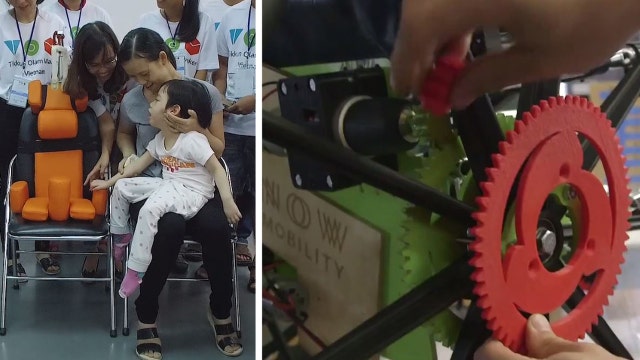Innovation for people with disabilities
How one non-profit is galvanizing a global movement of innovators to create affordable solutions for people with disabilities around the globe
Riding a bike. Taking a coffee break. Opening a tube of paint. They may sound like simple actions, but for people with disabilities, these activities can pose challenges that make it hard to live independently.
That’s where TOM (Tikkun Olam Makers) comes in. TOM was set up by Israeli nonprofit Reut Group to tackle issues faced by people with disabilities (“Tikkun olam” is Hebrew for “repair the world”). Specifically, TOM aims to harness the creativity of the high-tech “Maker” community to develop technologies for disabled people.
“Millions of people live with disabilities and face ‘neglected problems,’ where there is no corporate interest or government capability to solve them,” Reut Group Founder and President Gidi Grinstein told FoxNews.com. “This happens because these people are too poor, or their disability is rare or special. In many cases, the solution exists but the price is prohibitive and they simply cannot afford the solution to their problem.”
CES: HIGH-TECH DISPLAY AIMS TO MAKE DRIVING SAFER
“Makeathons” are at the heart of Tom’s efforts. The 72-hour events bring two groups of people together; “Need Knowers,” or people with disabilities, and “Makers” such as coders, designers, engineers and programmers. The Need Knowers present challenges to the Makers, who then work together to create affordable open source solutions
Since it launched in 2014, TOM has hosted 16 Makeathons in 14 cities around the world and plans to expand.
“We want to be able to impact not just one person … but to impact the lives of 250 million people over the next ten years and the scalable model we built has the potential to do exactly that,” Rebecca Fuhrman, Tom’s architect of inspiration, told FoxNews.com.
IBM WORKING ON BOT TO HELP ELDERLY AGE AT HOME
The next Makeathon will take place Jan. 8-10, at the Technion Institute in Haifa, Israel. Some 20 challenges are going to be tackled by 120 makers from the U.S., Canada, Australia, China, India and Israel. Projects on the agenda include creating an app to help people with disabilities find accessible transportation, a system to “call” a wheelchair to a person’s bedside, and building a supportive, portable bathroom chair.
TOM will also be hosting a Makeathon in New York City from April 21 to 23.
“TOM was shaped by the idea of inclusive society and embodies this ideal in multiple ways: First, it integrates people dealing with disabilities into its team, as they not only share their needs but also participate in the design of the solutions, working hand-in-hand with engineers, programmers, product designers and other professionals,” said Grinstein. “Second, TOM is a platform for making our entire society more inclusive, as it allows the most talented top professionals to contribute the best of their skills toward alleviating the difficulties faced by societies most challenged.”
Once complete, the designs and instructions for making them are uploaded into what’s called the Open Makers Market. It’s a website that anyone can access and adapt to their needs. “TOM’s products are open-source, which means that no one owns their intellectual property. This allows many people from around the world to participate in the development process and to benefit from the products,” explained Grinstein.
TOM has already enjoyed some significant successes. In June 2016 Ho Chi Minh City, Vietnam, hosted its first Makeathon. Makers there met 4-year-old Phuong Uyen. She cannot walk or control her head or neck. Her mother carries her daughter everywhere or has to put her on the floor. She requested a wheelchair that could expand, so that her young child wouldn’t need a new one as she grows. According to Fuhrman, a wheelchair can cost about $2,000 on average and needs to be replaced approximately every two years. Uyen’s family earns $300 a month. Designers at the Ho Chi Minh City Makeathon, however, were able to create an $88 wheelchair that supports her body and expands as she grows.
According to the World Health Organization, 70 million people worldwide are in need of wheelchairs but only 5 to 15 percent have access to them.
Another success story came out of TOM’s first Makeathon in 2014. A plastic grid was designed and laser cut for a child who was having trouble pressing the buttons on a communication device. The design was uploaded to the Open Makers Market and then adapted to assist a family in need of similar assistance. “There are now more than fifty families worldwide that are connecting with local Makers to get a grid made for their kids too,” Fuhrman told FoxNews.com. “That blossoming relationship between Makers and people with disabilities is key - and we hope that this will just be a starting point for people in need to see the Maker community as a resource to develop affordable solutions for their neglected challenges.”









































